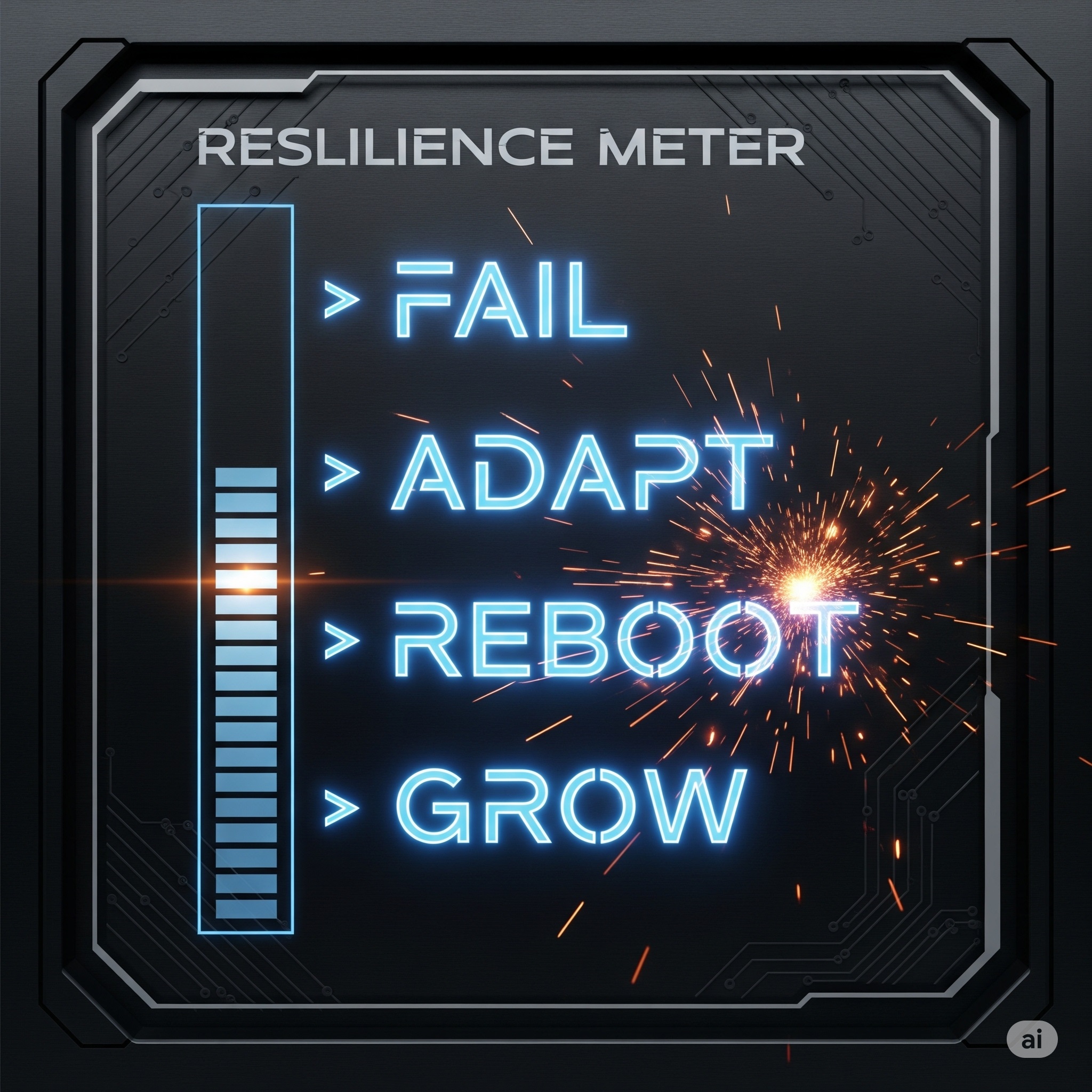
Write what you are looking for and press enter to begin your search!

Introduction
The traditional path to career success—four years of university, mounting debt, and a piece of paper that supposedly guarantees employment—is crumbling before our eyes. While your peers accumulate student loans and theoretical knowledge, you're about to discover how to engineer a bulletproof career through strategic failure, rapid recovery, and the systematic development of grit. This article will reveal why "failing fast" isn't just Silicon Valley jargon but your secret weapon as a self-learner, how to bounce back faster than your degree-holding competitors, and the precise steps to build the psychological armor that makes careers truly unbreakable.
The Silicon Valley Mantra That Changed Everything
"Fail fast" wasn't coined by some motivational speaker or self-help guru. It emerged from the high-stakes world of Silicon Valley entrepreneurship, popularized by venture capitalist Randy Komisar and later amplified by tech giants like Facebook and Google. The phrase crystallized a revolutionary approach to innovation: instead of spending years perfecting a product in isolation, release early versions, gather feedback, and iterate rapidly.
But here's the controversial truth most career advisors won't tell you: this philosophy is infinitely more valuable for self-learners than for tech startups. While companies can pivot with funding and teams, self-learners who master the art of failing fast gain an almost unfair advantage in today's rapidly evolving job market.
The reason we use this phrase obsessively isn't because failure has become trendy—it's because the cost of failing slowly has become astronomical. In a world where entire industries can become obsolete within a decade, the ability to quickly identify what doesn't work and pivot becomes more valuable than any degree. When you fail fast as a self-learner, you're not just saving time; you're developing a meta-skill that most university graduates never acquire: the ability to learn from real-world feedback loops rather than academic theory.
Why Bouncing Faster Is Your Competitive Edge
Traditional education teaches you to avoid failure at all costs. Get the right answer, follow the syllabus, and graduate with honors. This approach produces graduates who are psychologically fragile when faced with real-world challenges. As a self-learner, your ability to bounce back faster than your formally educated competitors becomes your greatest asset.
The mathematics of resilience are brutal and beautiful. While your degree-holding peers are paralyzed by their first major setback—questioning their expensive education, spiraling into imposter syndrome, or retreating to safe, unchallenging roles—you're already analyzing what went wrong and implementing version 2.0 of your approach.
Consider this: the average self-learner encounters rejection, failure, and setbacks at a rate roughly 3x higher than traditional students. This sounds like a disadvantage until you realize it's actually a feature, not a bug. Each failure becomes a data point, each rejection a course correction, each setback a strengthening exercise. By the time you've been self-learning for two years, you've developed failure tolerance that takes traditionally educated people a decade to build, if they ever build it at all.
The dirty secret of the modern economy is that adaptability trumps credentials. Companies don't need employees who can recite textbook answers; they need people who can navigate uncertainty, recover from mistakes quickly, and iterate their way to solutions. Your accelerated bounce-back rate isn't just a nice-to-have skill, it's the most in-demand competency in the 21st century workplace.

Engineering Grit: The Systematic Approach to Psychological Bullet proofing
Grit isn't something you're born with or without. It's an engineered trait, and self-learners have unique advantages in developing it systematically. Traditional students develop grit accidentally through occasional challenges. You're going to build it deliberately through a structured approach.
Step 1: Calibrate Your Failure Tolerance
Start by deliberately seeking out challenges where failure is likely. This isn't about being reckless; it's about building your psychological immune system. Apply for jobs slightly above your current level. Attempt projects that stretch your abilities. The goal isn't to fail, but to become comfortable with the possibility of failure.
Step 2: Create Feedback-Rich Environments
Traditional education provides feedback through grades months after the fact. As a self-learner, you need immediate, actionable feedback loops. Build projects that can be tested and critiqued quickly. Share your work early and often. Join communities where constructive criticism is the norm, not the exception.
Step 3: Develop Meta-Learning Skills
This is where self-learners often surpass their formally educated peers. You're not just learning specific skills; you're learning how to learn efficiently. Document your learning process. Identify your optimal learning conditions. Develop systems for retaining and applying new information. These meta-skills compound over time, making you increasingly effective at acquiring new competencies.
Step 4: Build Your Professional Network Strategically
Here's a truth that might sting: your network is often more valuable than your knowledge. But as a self-learner, you have unique networking advantages. You're not limited to classmates from your graduation year or professors in your department. You can connect with practitioners at any level, in any industry, anywhere in the world. Use this freedom strategically.
Step 5: Create Tangible Proof of Competence
While your degree-holding peers have diplomas, you need something more powerful: demonstrable results. Build a portfolio that showcases not just what you can do, but how you think and solve problems. Document your learning journey. Show your work, including your failures and how you recovered from them.

The Anatomy of a Bulletproof Career
A bulletproof career isn't one that never faces challenges it's one that becomes stronger with each challenge encountered. For self-learners, this means building careers around adaptability rather than credentials.
Financial Resilience: Bulletproof careers aren't dependent on single employers or industries. They're built on diversified skill sets that create multiple income streams. While your degree-holding peers are optimizing for single career tracks, you're building what I call "skill portfolios"—combinations of competencies that create unique value propositions.
Industry Agnosticism: The most resilient self-learners develop skills that transfer across industries. While others are becoming experts in narrow specializations, you're becoming fluent in the underlying patterns that drive success across multiple domains. This isn't about being a generalist; it's about understanding the deep structures that govern different fields.
Continuous Evolution: Bulletproof careers are never "finished." They're living systems that evolve continuously. Your ability to self-direct your learning means you can anticipate industry shifts and adapt proactively rather than reactively. While others are responding to changes, you're already three steps ahead.
Reputation-Based Security: In the gig economy, your reputation becomes your job security. Self-learners who consistently deliver results, recover gracefully from setbacks, and demonstrate continuous growth build professional reputations that open doors regardless of formal credentials.
Getting on the Bulletproof Track
The path to a bulletproof career as a self-learner requires rejecting several widely accepted myths. First, abandon the idea that you need to "finish" your education before starting your career. Begin building professional relationships and taking on real projects immediately. Second, stop seeking permission to call yourself a professional. If you can solve problems and create value, you're already qualified. Third, embrace the fact that your path will be messier and less linear than traditional career trajectories, this isn't a bug, it's a feature.
Start by identifying industries or roles where results matter more than credentials. Technology, sales, marketing, creative fields, and entrepreneurship are obvious choices, but don't limit yourself. Every industry has aspects where demonstrated competence trumps formal education.
Next, create systems for continuous skill acquisition. This isn't about taking online courses (though that might be part of it); it's about building learning directly into your work. Seek out projects that force you to develop new capabilities. Volunteer for challenging assignments. Create side projects that push your boundaries.
Finally, develop what I call "professional courage"—the willingness to bet on yourself when others won't. This means taking on responsibilities before you feel fully qualified, speaking up in meetings when you have insights to offer, and consistently putting yourself in situations where growth is the only option.
Conclusion
The path we've outlined isn't for everyone, and that's precisely why it works. While the majority clings to the illusion of credential-based security, self-learners who master the art of failing fast and bouncing faster are building truly antifragile careers.
We've explored how "fail fast" evolved from Silicon Valley necessity to self-learner superpower, why rapid recovery becomes your competitive advantage in an adaptability-driven economy, the systematic approach to engineering psychological resilience, and the specific characteristics that make careers genuinely bulletproof.
Key Takeaways for Your Self-Learning Journey:
• Embrace failure as data, not judgment—each setback provides information for better decision-making
• Develop faster recovery cycles than your traditionally educated competitors through deliberate practice
• Build grit systematically through calibrated challenges, feedback-rich environments, and meta-learning skills
• Create career security through adaptability and reputation rather than credentials and job titles
• Start building professional relationships and taking on real projects immediately—don't wait for permission
• Focus on developing skill portfolios that create value across multiple industries and contexts
• Remember that your messy, non-linear path is a feature, not a bug—it's building exactly the kind of resilience the future economy rewards
The question isn't whether you can compete with degree holders—it's whether they can keep up with you. Your ability to fail fast, bounce faster, and continuously evolve isn't just a career strategy; it's a fundamental advantage in a world that rewards adaptability above all else. The only question remaining is: are you ready to engineer your own bulletproof future?
Yes https://topolakd.net
rsrd\jzfdnzfd vbfdxb
swfewqfv sht n
Accountability is key to growth, and sharing your journey publicly adds a whole...